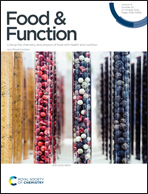Differential effects of a cafeteria diet and GSPE preventive treatments on the enterohormone secretions of aged vs. young female rats
Abstract
Grape seed derived procyanidins (GSPE) have been shown to effectively prevent intestinal disarrangements induced by a cafeteria diet in young rats. However, little is known about the effects of procyanidins and cafeteria diet on enterohormone secretion in aged rats, as the ageing processes modify these effects. To study these effects in aged rats, we subjected 21-month-old and young 2-month-old female rats to two sub-chronic preventive GSPE treatments. After three months of cafeteria diet administration, we analysed the basal and stimulated secretion and mRNA expression of CCK, PYY and GLP-1, caecal SCFA and intestinal sizes. We found that the effects of a cafeteria diet on the basal duodenal CCK secretion are age dependent. GLP-1 in the ileum was not modified regardless of the rat's age, and GSPE preventive effects differed in the two age groups. GSPE pre-treatment reduced GLP-1, PYY and ChgA in mRNA in aged ileum tissue, while the cafeteria diet increased these in aged colon. The GSPE treatments only modified low-abundance SCFAs. The cafeteria diet in aged rats increases the caecum size differently from that in young rats and GSPE pre-treatment prevents this increase. Therefore, ageing modifies nutrient sensing, and the cafeteria diet acts mainly on the duodenum and colon, while procyanidins have a larger effect on the ileum.



 Please wait while we load your content...
Please wait while we load your content...